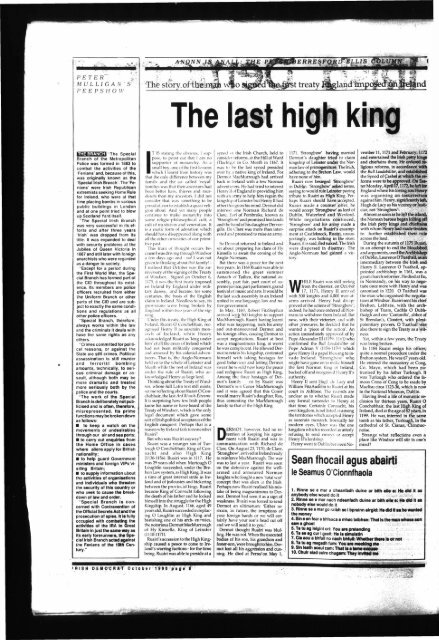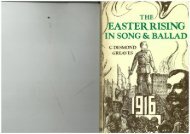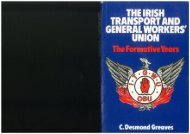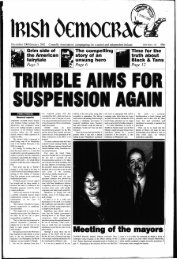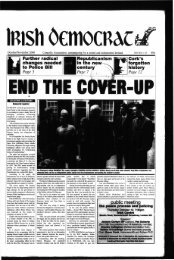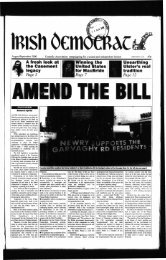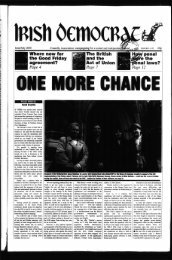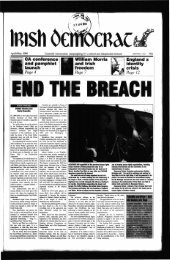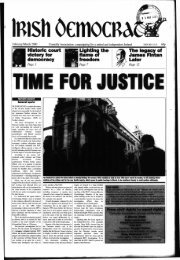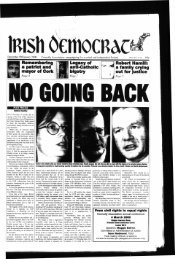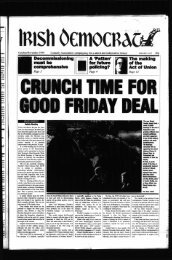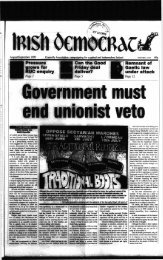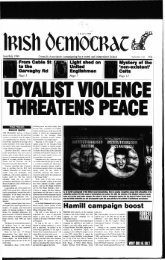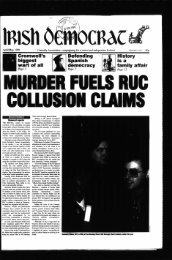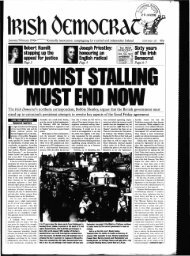Irish Democrat October 1990
Create successful ePaper yourself
Turn your PDF publications into a flip-book with our unique Google optimized e-Paper software.
P E T E R<br />
- r*' '••»• •* . * ' ,<br />
———<br />
M U L L I G A N ' S<br />
P E E P S H O W<br />
The last hi<br />
THE BRANCH The Special IT IS stating the obvious, I suppose,<br />
to point out that I am no<br />
Branch of the Metropolitan<br />
Police was formed in 1883 to supporter of monarchy. As a<br />
combat the activities of the small boy, one of the first lessons<br />
Fenians' and, because of this, which I learnt from history was<br />
was originally known as the that the only difference between my<br />
Special <strong>Irish</strong> Branch'. The 'Fenians'<br />
were <strong>Irish</strong> Republican families was that their ancestors had<br />
familv and the so- called 'royal'<br />
extremists seeking Home Rule been better liars, thieves and murderers<br />
than my ancestors. I did not<br />
for Ireland, who were at that<br />
time placing bombs in various consider that was something to be<br />
public buildings in London proud of, nor to establish a quasi-religion<br />
about. And vet many people<br />
and at one point tried to blow<br />
up Scotland Yard itself.<br />
continue to make monarchy into<br />
"The Special <strong>Irish</strong> Branch some religio-philosophical cult; a<br />
was very successful in its efforts<br />
and after three years is a exotic form of adoration which<br />
cult of mysticism and veneration. It<br />
<strong>Irish</strong>' was dropped from its should have disappeared along with<br />
title. It was expanded to deal all the other curiosities of our primitive<br />
past.<br />
with security problems at the<br />
Jubilee of Queen Victoria in This train of thought occurs because<br />
I was driving through Windsor<br />
1887 and still later with foreign<br />
anarchists who were regarded a few days ago and - no! I was not<br />
as a danger to society.<br />
given to thinking about that family! -<br />
Except for a period during I realised that <strong>October</strong> was the anniversary<br />
of the signing of the Treaty<br />
the First World War, the Special<br />
Branch has formed part of of Windsor. Signed on <strong>October</strong> 6,<br />
the CID throughout its existence.<br />
Its members are police on Ireland bv England under mili-<br />
1175, it was the first treaty imposed<br />
officers recruited from either tarv duress, and became, for some<br />
the Uniform Branch or other centuries, the basis of the English<br />
parts of the CID and are subject<br />
to exactly the same condi-<br />
provisions were being broken bv<br />
claim in Ireland. Needless to say, its<br />
tions and regulations as all England within two years of the signing.<br />
other police officers. .<br />
'Special Branch, therefore, Under this treatv, the High King of<br />
always works within the law Ireland, Ruairi O Conchobhair, recognised<br />
Henry II as suzerain mon-<br />
and the criminals it deals with<br />
have the same rights as any arch of Ireland, while Henry<br />
ethers.<br />
acknowledged Ruairi as 'king under<br />
"Crimes committed for political<br />
reasons, or against the had not been militarily conquered<br />
him' of all the areas of Ireland which<br />
State are still crimes. Political and annexed bv his colonial adventurers.<br />
That is, the Anglo-Normans<br />
assassination is still murder<br />
and terrorist bombing held on to the whole of Leinster and<br />
amounts, technically, to serious<br />
criminal damage or as-<br />
under the rule of Ruairi, who ac-<br />
Meath while the rest of Ireland was<br />
sault, although both may be knowledged Henry as liege lord.<br />
more dramatic and treated Thinking about the Treaty of Windsor,<br />
whose full Latin text still exists,<br />
more seriously both by the<br />
police and the courts.<br />
set me reflecting about Ruairi OConchobhair,<br />
the last Ard Rim h-Eireann.<br />
The work of the Special<br />
Branch is deliberately not publicised<br />
and is often, therefore, know his name or have heard of the<br />
It is surprising how few <strong>Irish</strong> people<br />
misrepresented. Its prime Treaty of Windsor, w hich is the only<br />
functions may be broken down legal document which gave some<br />
as follows:<br />
sort of <strong>Irish</strong> political acceptance of the<br />
• to keep a watch on the English conquest. Perhaps that is a<br />
movements of undesirables reason whv Ireland fails to remember<br />
through our air and sea ports; Ruairi?<br />
• to carry out enquiries from But who was Ruairi anyway?<br />
the Home Office in cases Ruairi was a younger son of Turlough<br />
O Conchobhair, King of Con-<br />
where aliens apply for British<br />
nationality;<br />
nacht and also High King<br />
• to help guard Government (1136-1156). Ruairi was in 1117. He<br />
ministers and foreign VIPs visiting<br />
Britain;<br />
Loughlin succeeded, under the Bre-<br />
was 29 years old when Murtough O<br />
• to supply information (.bout hon Law system, as High King. It was<br />
tho activities of organisations a time of great internal strife in Ireland<br />
and of jealousies and bickering<br />
and individuals who threaten<br />
the security of this country or between the provincial kings. Ruairi<br />
who seek to cause the breakdown<br />
of law and order.<br />
the death of his father and he locked<br />
become King of Connacht following<br />
"Special Branch is concerned<br />
with Contravention of Kingship. In August, 1166, aged 49<br />
himself into the struggle for the High<br />
the Official Secrets Act and the years old, Ruairi succeeded in replacing<br />
O Loughlin as High King and<br />
prosecution of spies. It is fully<br />
occupied with combating the banishing one of his arch- enemies,<br />
activities of the IRA in Great the notorious Dermot MacMurrough<br />
Britain in just the same way as of Hy Kinsella, King of Leinster<br />
its early forerunners, the Special<br />
<strong>Irish</strong> Branch acted against Ruairi's accession to the High King-<br />
(1110-1171).<br />
tt»e Fenians of the 19th Century.land's<br />
warring factions - for the time<br />
ship caused a peace to come to Ire-<br />
being. Ruairi was able to preside at a<br />
JRI9N DEMO-CRAT 0 c t o b e r 1 9 9 0 - p a fl • r<br />
synod oi the <strong>Irish</strong> Church, held to<br />
consider reforms, at the Hill of Ward<br />
(Tlachtga) in Co. Meath in 1167. It<br />
was to be the last synod presided<br />
over bv a native king of Ireland. For<br />
Dermot MacMurrough had arrived<br />
back in Ireland with a few Norman<br />
adventurers. He had tried to interest<br />
Henry 11 of England in providing him<br />
with an army to help him regain the<br />
kingship of Leinster but Henry II had<br />
other things on his mind. Dermot did<br />
interest one Norman Richard de<br />
Clare, Earl of Pembroke, known as<br />
'Strongbow' and promised him lands<br />
and the hand of his daughter Dervorgilla.<br />
De Clare was more than interested<br />
and promised to raise an army.<br />
So Dermot returned to Ireland and<br />
set about preparing his clans of Hy<br />
Kinsella to await the coming of the<br />
Anglo-Normans.<br />
But there was a peace for the next<br />
two years. In 1168 Ruairi was able to<br />
summoned the great summer<br />
Aonach of Tailten, the national assembly,<br />
part fair, part court of supreme<br />
justice, part parliament, grand<br />
festival of music and arts. It would be<br />
the last such assembly in an Ireland<br />
united in one language, law and native<br />
government.<br />
In Mav, 1169, Robert FitzStephan<br />
arrived with 500 knights to support<br />
MacMurrough. Ruairi having learnt<br />
what was happening, took his army<br />
and out-manoeuvred Dermot and<br />
his foreign allies, causing Dermot to<br />
accept negotiations. Ruairi at best<br />
was a magnanimous king, at worst<br />
he was complacent. He allowed Dermot<br />
to retain his kingship, contented<br />
himself with taking hostages for<br />
good behaviour and letting Dermot<br />
swear he would now keep the peace<br />
and recognise Ruairi as High King.<br />
Among the three hostages of Dermot's<br />
family en by Ruairi was<br />
Dermot's sen Conor MacMurrough<br />
and it was agreed that this Conor<br />
would marry Ruairi's daughter, Ros,<br />
thus cementing the MacMurrough<br />
family to that of the High King.<br />
DERMOT, however, had no intention<br />
of keeping his agreement<br />
with Ruairi and was in<br />
communication with Richard de<br />
Clare. On August 23,1170, de Clare,<br />
'Strongbow', arrived in Ireland ready<br />
to reinforce MacMurrough. The war<br />
was to last a year. Ruairi was soon<br />
on the defensive against the wellarmed<br />
and armoured Norman<br />
knights who fought a new 'total war'<br />
concept that was alien lo the <strong>Irish</strong>.<br />
Perhaps now Ruairi realised his mistake<br />
of being magnanimous to Dermot.<br />
Dermot had seen it as a sign of<br />
weakness. Ruairi was forced to send<br />
Dermot an ultimatum: 'Either restrain,<br />
in future, the irruptions of<br />
your foreign bands or we will certainly<br />
have your son's head cut off<br />
and we will send it to you.'<br />
Dermot thought Ruairi was bluffing.<br />
He was not. When the executed<br />
bodies of his son, his grandson and<br />
foster-son, were brought to him, Dermot<br />
lost all his aggression and cunning.<br />
He died at Ferns;'on May 1,<br />
1171. 'Strongbow' having married<br />
' Dermot's daughter tried to claim<br />
kingship of Leinster under the Norman<br />
law of primogeniture. The Iri^h,<br />
adhering to the Brehon Law, would<br />
have none of him.<br />
Ruairi now besieged 'Strongbow'<br />
in Dublin. 'Strongbow' asked terms,<br />
saying to would rule Leinster paying<br />
!<br />
tribute to Ruairi as High King. Perhaps<br />
Ruairi should have accepted.<br />
Ruairi made a counter offer, he<br />
would accept 'Strongbow' as lord of<br />
Dublin, Waterford and Wexford.<br />
While negotiations continued,<br />
'Strongbow' and hi? army made a<br />
surprise attack on Ruairi's encampment<br />
at Castleknock, Ruairi, unsuspectingly,<br />
was bathing in the river.<br />
Ruairi, it is said, fled naked. The <strong>Irish</strong><br />
were dispersed in disarray. The<br />
Anglo-Normans had gained a victory.<br />
WHILE Ruairi was still reeling<br />
from the disaster, on <strong>October</strong><br />
17, 1171, Henry II armed<br />
with 500 knights and 4,000 men-atarms<br />
arrived. Henry had disapproved<br />
of the actions of 'Strongbow';<br />
indeed, he had once ordered all Normans<br />
to withdraw from Ireland. But<br />
now, with their victories, and with<br />
other pressures, he decided that he<br />
wanted a 'piece of the action'. An<br />
action immediately approved of by<br />
Pope Alexander III (1159-1181) who<br />
confirmed the Bull Laudabiliter of<br />
Pope Adrian V (1154-1159) which<br />
gave Henry II a papal blessing to invade<br />
Ireland. 'Strongbow' who<br />
might have gone on to make himself<br />
the first Norman King of Ireland,<br />
backed off and recognised I lenry II's<br />
authority.<br />
Henry II sent Hugl de Lacy and<br />
William FitzAudelin to Ruairi at his<br />
court in Athlone. The records are<br />
unclear as to whether Ruairi made<br />
any formal surrender to Henry at<br />
that time. Certainly Connacht, his<br />
own kingdom, is not listed as among<br />
the territories which accepted Henry<br />
as suzerain monarch. Ironically for<br />
modern eyes, Ulster was the one<br />
kingdom which is recorded as utterly<br />
refusing to send envoys or accept<br />
Henry II's lordship<br />
Henry went to Dublin between November<br />
11,1171 and February, 1172<br />
and entertained the <strong>Irish</strong> petty kings<br />
and chieftains there. He ordered religious<br />
reforms, in accordance with<br />
the Bull Laudabiliter, and established<br />
the Synod of Cashel at which the reforms<br />
were to be approved. On Easter<br />
Monday, April 17,1172, he left for<br />
England where his loving son Hairy<br />
was organising an insurrection<br />
against him. Henry, significantly left,<br />
Hugh de Lacy as his viceroy or Justiciar,<br />
not 'Strongbow'.<br />
Almost as soon as he left the island,<br />
the Norman barons began killing off<br />
the <strong>Irish</strong> pietty kings and chieftains<br />
with whom Henry had made treaties<br />
to further established their rule<br />
across the land. •<br />
During the autumn of 1175 Ruairi,<br />
in an attempt to end the bloodshed<br />
and arguments, used the Archbishop<br />
of Dublin, La u rence O Tuathail, as an<br />
intermediary between the <strong>Irish</strong> and<br />
Henry II. Laurence O Tuathail, appointed<br />
archbishop in 1161, was a<br />
great church reformer. He died at Eu,<br />
in Normandy, on his way to negotiate<br />
once more with Henry and was<br />
canonised in 1220. O Tuathail was<br />
the man who organised the negotiations<br />
at Windsor. Ruairi sent his chief<br />
Brehon, Labhras, with the archbishop<br />
of Tuam, Cadhla O Dubhthaigh<br />
and one 'Cantordis', abbot of<br />
St Brendan's, Clonfert, with plenipotentiary<br />
powers. O Tuathail was<br />
also there to sign the Treaty as a Witness.<br />
Yet, within a few years, the Treaty<br />
was being broken.<br />
In 1184 Ruairi resign his offices;<br />
quite a normal procedure under the<br />
Brehon system. He was 67 years old.<br />
He entered the monastery at Cong,<br />
Co. Mayo, which had been patronised<br />
by his father Turlough. It<br />
was Turlough who ordered the famous<br />
Cross of Cong to be made by<br />
Maelisu circa 1123-36, which is now<br />
in the National Museum, Dublin.<br />
Having lived a life of monastic seclusion<br />
for thirteen years, Ruairi O<br />
Conchobhair, the last High King of<br />
Ireland, died at the age of 82 years, in<br />
1199. He was. interred in the same<br />
tomb as his father, Turlough, in the<br />
cathedral of St. Ciaran, Clonmacnoise.<br />
Strange what reflections even a<br />
place like Windsor will stir in one's<br />
mind?<br />
Sean fhocail agus abairti<br />
le Seamus O'Cionnfhaola<br />
1. Rinne se e mar a dheanfadh duine ar bith eile e: He did it as<br />
anybody else would do it<br />
2. Rinne se e mar nach ndeanfadh duine ar blth eile e: He did It as<br />
nobody else would do It<br />
3. Rinne se e mar go raibh se i bprainn airgid: He did It as he wanted<br />
the money<br />
4. Sin e an fear a bhfeaca a mhac taibhse: That is the roan whose son<br />
saw a ghost<br />
5. Ta tu ag leigint ort: You are pretending<br />
6. Ta se ag cur i gceil: He is simulatln<br />
7. Cla acu a bhfuil no nach bhfuil: Whether there Is or not<br />
8. Ta tu ag magadh fum: You are mocking me<br />
9. Sin leath sceul cam: That Is a lame excuse<br />
10. Chulr siad culre chugam: They Invited me<br />
.I-


